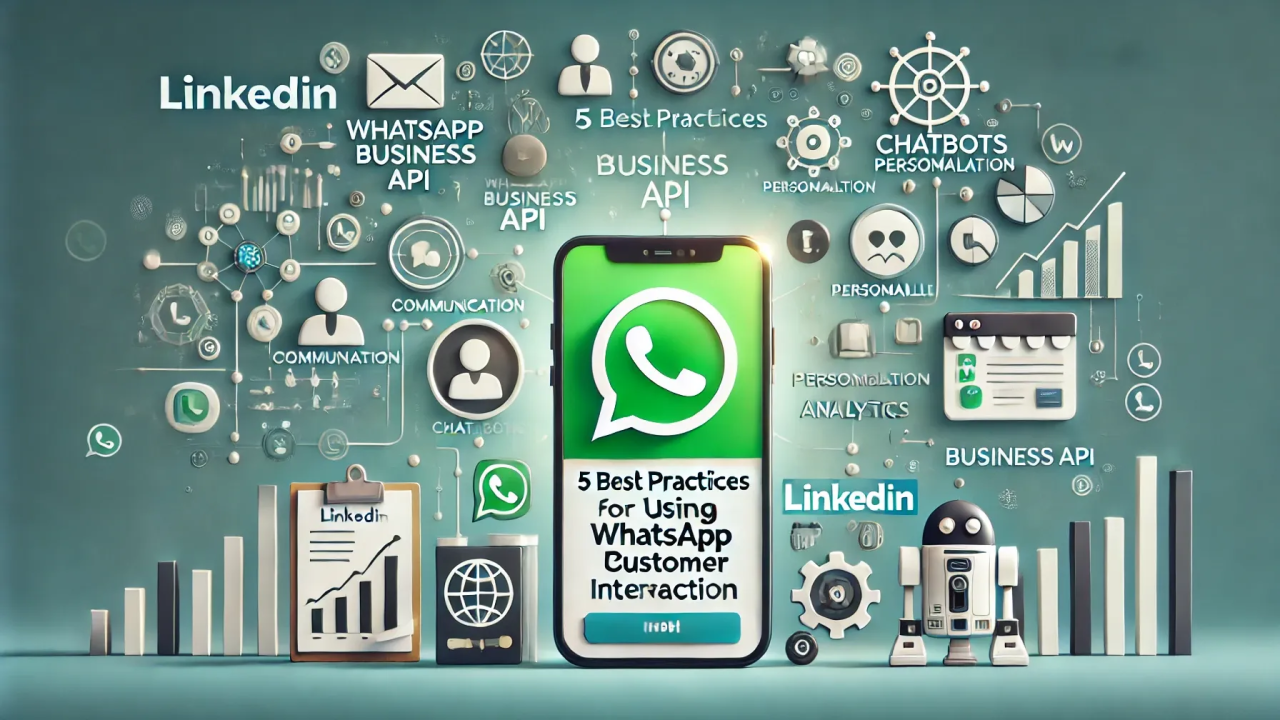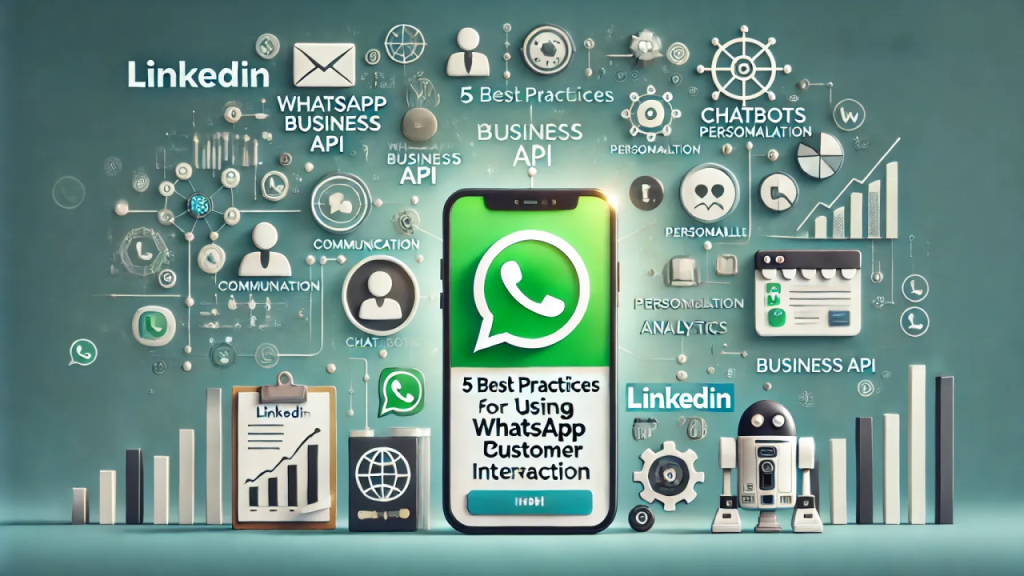
Businesses need to be where their customers are… and more often than not, they’re on messaging apps like WhatsApp in the fast-paced digital world of today. WhatsApp has over 2 billion users worldwide and is an essential platform for businesses to connect with their customer base. With WhatsApp Business API, companies take this to the next step by adding features that allow for more fluid communications management and automation of processes as well as personalization at scale.
But in the implementation of this API, there is a catch. Following best practices for maximizing the full power of this platform is essential in increasing customer touchpoints and seeing a notable ROI. We already know five tips to use are likely to find their way into applications built on WhatsApp Business API that will improve customer interaction.
1. Customize Communication with Customers
This type of personalization is quickly becoming a prerequisite for meaningful, impactful customer engagement. One of the features that WhatsApp Business API provides is enabling businesses to send highly contextual messages in a way, which only concerned customers receive.
How to Implement:
- Customer Data: Personalize your messages by using customer data like purchase history, preferences, and demographics. If a product was recently purchased, maybe you follow up with an email letting them know that their experience matters and if they need anything to get in touch.
- Segment Your Audience: Establish several segments from customer behavior or interests. Focus on what each audience wants, and create messages to hit specific points for them. For example, provide repeat clients with special promotions or recommend new products based on prior orders.
- Dynamic Message Templates: Use dynamic message templates to automatically include each customer’s name, order details, or location. This will save time and make your messages personable where they then pertain.
Benefits:
- Increased customer engagement and satisfaction
- Greater open as well as reply rates
- Enhancing customer loyalty with improved relationships.
2. Automate Mundane Tasks With Chatbots
The WhatsApp Business API has an important benefit of chatbot integration. These AI-driven systems will take over the routine questions, allowing human agents to handle more complex interactions.
How to Implement:
- 24/7 Customer Support: Implement a chatbot for day and night(customer) support. This can be anything from answering some FAQs to helping someone through how you use your product or even where their order is.
- Lead Qualification: Chatbots can interact with prospective leads, ask questions and qualify them according to their replies. The bot will gather the information it needs and pass it off to a real human for more personalized attention when needed.
- Order Processing: Automate order confirmations, shipping notifications, and delivery updates. Timely updates are appreciated by customers and automation helps in serving the information very swiftly.
Benefits:
- Increased efficiency and decreased manual workload for live agents.
- Better customer satisfaction (faster response times).
- Handling many client requests concurrently.
3. Be Compliant with WhatsApp’s Guidelines
WhatsApp Business API compliance is key, of course. Failure to comply can cause fines and even the closing of your business account. So, it is necessary to follow the rules and guidelines of WhatsApp.
How to Implement:
- Consent: You should get the consent of a customer before you send him/her any message. You can do this using your website through opt-in forms, in-store interactions, or even email. Explain to buyers what kinds of messages they can expect.
- With Caution: The Number of Messages Made Sending too many messages can simply irritate customers and drive up opt-out rates. Create a messaging strategy that combines consistent touchpoints while also being considerate of customer signaling.
- Junk Content Limitation: Never use promotional content to customers who have yet interacted with your brand. WhatsApp points to the use of its platform for transactional and customer service messages, not direct marketing. That means, use predefined messages for such cases and get them approved by WhatsApp.
Benefits:
- No suspension or penalties to your business account.
- Establish trust with your customers by honoring their preferences.
- Global Privacy Compliance, branding UserDefaults.
4. Use Rich Media to Engage Better
WhatsApp Business API is compliant with several types of rich content similar to images, video, PDF, and interactive buttons. By using these functions you can enhance your messages and create a better message.
How to Implement:
- Product Demos and Tutorials: Print videos or images on how to use your products or services. Great for customer onboarding or new product launches.
- Rich Media Templates: Make rich media messages templates with Buttons for Quick Replies, Call to Action (CTA) buttons or lists. Buttons can become CTAs, buttons will take care of your confirmation appointments and whether sales or quoting info.
- Interactive Customer Service: A visually rich way to drive customer service by providing customers with visual guides or PDFs that help them solve common problems and answer questions. This will decrease day-two live support needs and lead to a better consumer experience.
Benefits:
- Encourages engagement — with visual content being more attractive.
- Enhancements to interactions with customers through buttons and lists.
- Improved customer journey with helpful media.
5. Monitor and Optimize Performance
In order to always improve your customer interaction on WhatsApp you should create a report and watch some of these key performance metrics.
How to Implement:
- Monitor Metrics: Use chatbot analytics tools to monitor open rates, response times, and customer satisfaction (CSAT) scores as well conversion rate. Use these insights to learn what is working and not.
- A/B Testing: Try different formats, timings, and contents of your message to see the results in resonance with your audience. Take for instance A/B testing different CTAs and message templates to decide on what gets you more engagements.
- Feedback Loops: You can ask customers to feedback their experience. Leverage this feedback to iterate upon your messaging strategy and customer service, in general.
Benefits:
- Data-drive decisions and customer interaction enhancements.
- Develop messaging strategies and tactics – this is an iterative process.
- More tailored to the voice of the customer.
Conclusion
WhatsApp Business API is a new platform for businesses to cater their interaction with customers. With these best practices—personalization, chatbot automation, compliance monitoring, rich media usage, and performance tracking—you can start making meaningful connections with your customers to improve their experience as well as grow the business.
Employing these strategies will allow you to not only provide a better all-around experience for your customers but also distance yourself from the competition in an ever-growing market. As you refine your approach more and judge its results, it becomes apparent that what we consider as WhatsApp help is something really great!
